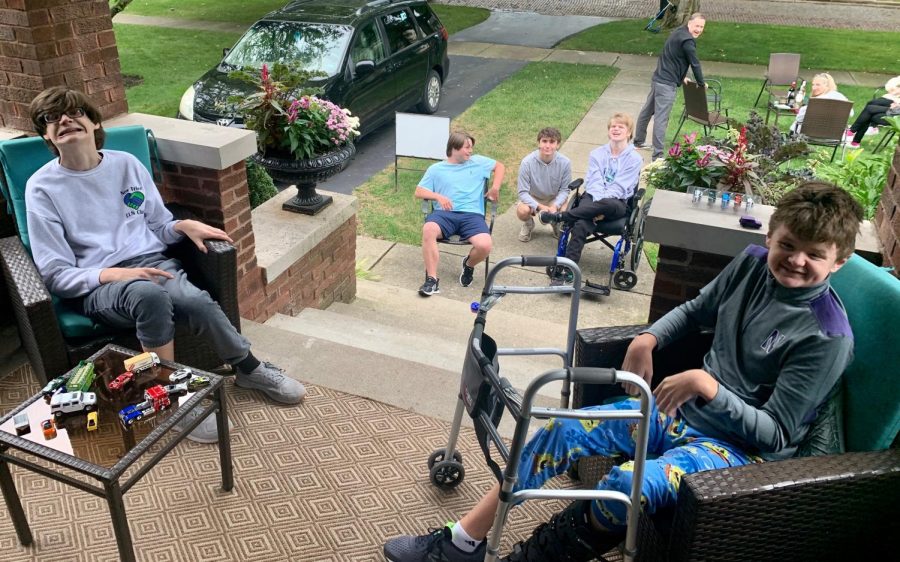ELS students, parents encouraged by school reopening
Parents of ELS students praise teachers’ dedication to providing a supportive learning environment on and off of Zoom
Torresarpi
Max Vircol (Left) and Connor Endre (Right) meet up with other ELS students during quarantine
While the pandemic has forced most students back to remote learning, special education students are still regularly going to school, and have been since September. That’s because going to school in person is more critical for students in the Educational Life Skills (ELS) population, and those with an Individualized Education Program (IEP). Many of these students have done well on Zoom, but others have had difficulty adjusting to remote learning.
“For our students in ELS and Transition, remote learning can be a challenge because it’s difficult to provide the students with support in the manner that they are used to,” said Sean Clemens, chairman of the Special Ed. Department. “Some have struggled and need to be in-person to receive their typical support.”
Even though some students prefer online learning,”Clemens says, “We know that we cannot replicate online what teachers are able to do for students in a classroom on a daily basis.”
Those in the ELS program and with significant IEPs have been going to school for 2.5 hours two days a week, either in the mornings or afternoons. However, each student has a unique schedule dictated to their needs.
Students have faced new challenges during remote learning, and those in the Special Education program are no different. However, some of the changes can be more intense for these students.
For many of these students, a routine is essential to keep them focused… “Some [of my students] had Increased anxiety because they weren’t following the regular routine of going to school,” says Lisa Devereux, an ELS teacher.
As the name implies, kids in the ELS population are taught life skills, and can take modified academic courses.
Even with so many obstacles, parents praise faculty for remaining as involved as possible. “The teachers have been remarkable…supportive, and outstanding,” says Kristen Endre, mother of Connor, a junior in the program.
The atmosphere between the teachers, students and parents of the program is a much different one than the rest of the school, parents say. “I’ve been to their houses, they’ve been to mine, they’ve taken my kid to lunch… it’s a different kind of relationship,” says Samantha Vircol, mother of Max Vircol, a junior in the ELS program. Sam also goes on to mention that her son’s teachers check in on her to make sure she has everything she needs at home. “They’ve been coaching me over Zoom, so I can help Max while we’re at home.”
Parents also praise the school’s safety protocols and preparation for students. In an effort to keep New Trier free from COVID-19, protective personal equipment, cloth masks, and scrubs are optional for those who need them. Plexiglass dividers are on each teacher’s desk, and in every classroom there are indicators for where to sit while practicing social distancing.
Students are expected to wear masks at all times while inside the school.“We’ve been working on wearing masks since the summer,” Devereux says.
When the weather’s warm, tents outfitted with desks, chairs and WiFI are available for classes if students prefer to learn in a less enclosed environment.
Even with all the turbulence, Kristen Endre remains positive about the school’s efforts: “To see your child learning in real time, even if it’s virtual, is some kind of gift.”







































